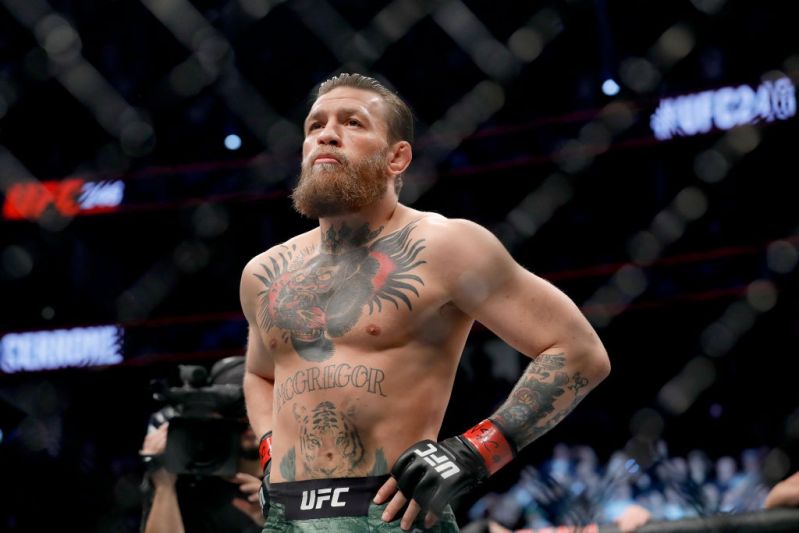
In 2020, the average contracted UFC fighter made approximately $148,000 when bonuses and base salary were added up. With each round lasting five minutes, fights three or five rounds in length, and three fights a year, in an extremely narrow view UFC fighters are some of the highest-paid athletes in the world. But this is reductive. Spend any time around these athletes and you’ll learn of the grueling training sessions each day, the murderous weight cuts, the months of self-sacrifice for an uncertain result. We don’t know exactly how much a UFC fighter makes per fight, but can break down known categories of pay to get a good idea as to their income.
UFC base salary and performance bonuses
At its base, UFC fighters are signed to contracts, which guarantee them a set amount per fight for a set number of fights over a duration of time. The numbers are not hard and fast; some fighters earn four figures and others claim six figures or more per battle, based on pedigree, experience within and without of the UFC, predictions, and investment. One should look at it like the baseline pay of a waiter: It’s something, sure, but not anything to brag about, and in many cases, not enough to live off of comfortably.
Related
Each fighter is also eligible to win certain performance bonuses as a direct result of his actions in the octagon. Traditionally there were two types of awards: Fight of the Night (FotN) and Performance of the Night (PotN). Two of each were awarded ostensibly by merit, with recipients netting an additional sum which, on inception, might vary from five figures to six. Since 2014, a $50,000 standardized amount has been added to whatever else the recipients were making. This was a boon of sorts because even if a fighter lost but went out on their shield in the effort, they stood to make much more than they had been guaranteed. Most recently, at February’s UFC 258, four Performance of the Night bonuses were dished out, with no Fight of the Night designations awarded, signaling a potential shift in awards but the same monetary amount.
Discretionary bonuses
Historically, former UFC President Dana White would grand bonuses for fights he liked but didn’t deem worthy of the FotN and PotN awards. Speaking with the New York Post in February 2021, White claimed to write additional checks based solely on his perception of the performance: “There will be a night where some crazy s–t happens throughout the whole card . . . I’ll write them anywhere from $10,000 to $25,000,” he said. And while this may seem like an even greater long shot, the totals are significant. In that same Post story, White claimed the UFC paid $13 million in bonuses in 2020, of which $4.6 million was awarded in these impulsive demi-awards. It works out to about $5,000 for each fighter in each fight if it were spread evenly that year (though it certainly was not). With White currently out of the UFC, these practices may have gone with his reign, but similar ones may remain and the money reserved for these deals are most likely being used in other ways, including more formal pay.
PPV bonuses and fighter marketability
Next are the sweeteners written into contracts, and they by and large reflect the fighter’s marketability to the company in sales of Pay-Per-Views. Are you a corn-fed former Division I wrestler that’s been manhandling hometown brawlers in small fights? You may get something, but probably not. Are you a former Olympic gold medalist who’s training in some obscure country? You’ve got some bargaining power. Eddie Alvarez, a lightweight who entered into the UFC via its chief rival Bellator, had caché enough to write in selling bonuses that might inflate his take-home to seven figures from a base pay of $80,000. (Uncharacteristically, Alvarez’s contract was leaked, and the UFC spoke at length about it in an interview with Bleacher Report.)
Sponsorships
Finally, UFC fighters have some leeway in which to sign contracts with individual sponsors, which also can carry their own bonus structures and base pay. They vary greatly. Conor McGregor was notorious (pun intended) for this, and his Instagram was once peppered with endorsements by Burger King and others (although these suffered after he assaulted a tour bus, was accused of rape, and sucker-punched an old man all within a two-year period). The higher the prestige of the fighter, the greater these amounts become, and McGregor himself, though holding no championship belt in 2020 and making less than $4 million through the UFC, nevertheless was 16 on Forbes’ annual “Highest-Paid Athletes in the World” list with $48 million, with the publication claiming he made $30 million alone when he knocked out Donald “Cowboy” Cerrone in 40 seconds. On the opposite end of the spectrum, Dynamic Fastener, which makes screws for builders and contractors, has sponsored gobs of fighters, all of whom receive some amount for screening its logo on their shorts. Mileage, obviously, may vary.
Recommended Reading
- Do UFC Fighters Wear Cups?
- How Long Is a UFC Fight?
- How Many Rounds Are There in a UFC Fight?
- What Does No Contest Mean in UFC?



